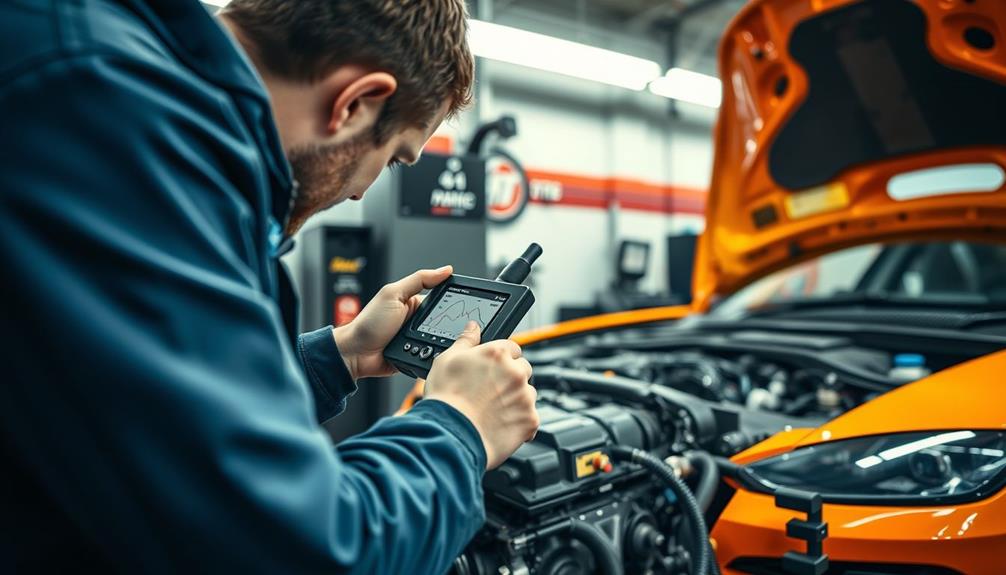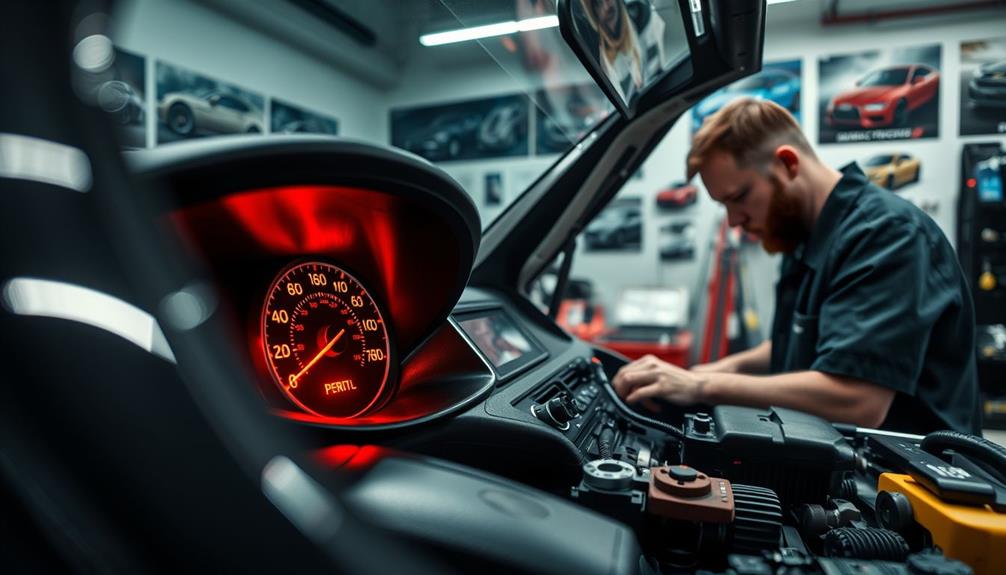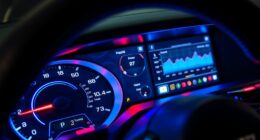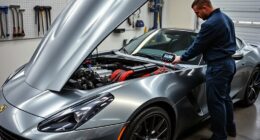To improve your car’s fuel efficiency yourself, focus on regular maintenance like oil changes, air filter replacements, and proper tire inflation. Adopt smart driving habits such as gentle acceleration, low-speed cruising, and minimizing idling. Plan trips to avoid traffic, and keep weight within recommended limits by removing unnecessary items. Small tweaks in aerodynamics, like avoiding roof racks, can also help. Keep these tips in mind to get better mileage—discover more ways to save with the next steps.
Key Takeaways
- Regularly change your engine oil and air filters to ensure smooth engine operation and optimal airflow.
- Keep tires properly inflated and check tread depth for better traction and reduced rolling resistance.
- Plan trips using GPS to find the shortest, least congested routes and avoid unnecessary idling.
- Drive gently with smooth acceleration and braking, and use cruise control on highways to maintain steady speed.
- Remove excess cargo and external accessories that increase drag and weight, improving overall fuel efficiency.
Regular Maintenance for Peak Performance
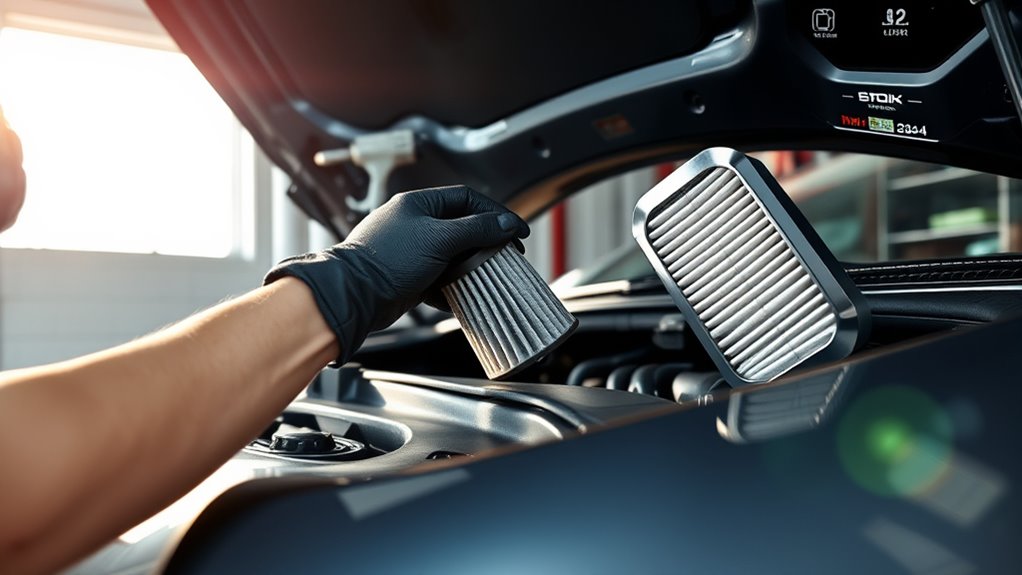
Regular maintenance is essential to keep your car running at its best and maximize fuel efficiency. Start with engine tune-ups, which can boost your fuel economy by up to 4% by optimizing engine performance. Make sure to change your oil on time; fresh, properly lubricated parts run more smoothly and efficiently. Using the correct motor oil grade can also improve fuel economy by 1-2%. Keep your air filter clean and replace it regularly to ensure ideal airflow for combustion. Regular engine servicing helps all components function efficiently, reducing unnecessary fuel consumption. Proper maintenance helps prevent costly repairs and ensures the vehicle operates with accurate engine calibration, which is vital for optimal fuel efficiency. These small steps prevent engine strain and keep your vehicle performing at its peak, saving you money on fuel and repairs in the long run. Additionally, maintaining engine components can help improve overall vehicle performance. Consistent maintenance is key to a more efficient, reliable ride.
Smart Driving Habits to Save Fuel

Adopting smart driving habits can substantially boost your vehicle’s fuel efficiency. Consistent, gentle acceleration and braking help preserve momentum and reduce engine strain, saving fuel. Use cruise control on highways to maintain steady speeds and avoid unnecessary throttle changes. Stick to posted speed limits; speeding can decrease mileage by up to 33%. Anticipate traffic to minimize abrupt stops, and avoid idling during prolonged stops—turn off your engine instead. Limit air conditioning and auxiliary electronics, which increase engine load. Proper gear shifting, avoiding over-revving, and removing excess weight or roof racks also make a difference. Planning routes to avoid congestion and maintaining safe following distances help keep your driving smooth. Additionally, keeping your tires properly inflated reduces rolling resistance, which directly contributes to better fuel economy. Regularly checking your tire pressure can prevent fuel waste caused by under-inflated tires. Implementing a proactive maintenance routine ensures your vehicle operates at optimal efficiency. Here’s a quick visual:
| Driving Habit | Impact | Tips |
|---|---|---|
| Gentle acceleration | Saves fuel, reduces strain | Accelerate gradually |
| Maintain steady speed | Improves efficiency | Use cruise control |
| Avoid idling | Reduces fuel waste | Turn off engine |
| Limit accessories | Less engine load | Reduce AC, electronics |
| Proper gear shifting | Optimizes engine performance | Shift smoothly |
Effective Trip Planning and Routing

Have you ever considered how smarter trip planning can save you money and fuel? Using GPS tools like Google Maps or Waze helps you find the most efficient routes, avoiding traffic and unnecessary stops. Proper route planning minimizes congestion and reduces overall driving time, which ultimately conserves fuel and lowers emissions. Planning trips during off-peak hours reduces time spent in stop-and-go traffic, which can drain fuel. Opting for longer highway stretches instead of urban routes improves efficiency because there are fewer stops and starts. Some GPS systems offer fuel-efficient routing options, lowering emissions and saving fuel. Real-time traffic updates allow you to adjust your route on the fly to avoid congestion. Understanding how to optimize your route can also help mitigate market volatility effects on fuel prices and consumption.
Optimizing Vehicle Load and Aerodynamics

Optimizing your vehicle’s load and aerodynamics can considerably boost fuel efficiency. Heavier loads increase fuel consumption, especially on inclines, so keeping cargo and passengers within recommended limits is essential.
Distribute weight evenly to improve stability and reduce drag, which helps your vehicle move more smoothly. Using load optimization tools can maximize space and maintain proper balance, cutting down on unnecessary fuel use. Additionally, reducing height and external accessories like roof racks or carriers minimizes air resistance. Covering cargo with aerodynamic fairings and ensuring doors and panels are tightly closed further decrease drag.
Regularly removing excess items and unnecessary equipment lightens the load, making your vehicle more efficient. Proper weight management reduces engine strain, and streamlining your vehicle profile helps you see noticeable improvements in fuel economy. Incorporating aerodynamic design principles can further enhance your vehicle’s efficiency by decreasing air turbulence and drag. Emphasizing automated systems in vehicle design can also help optimize performance and reduce fuel consumption over time.
Ensuring Proper Tire and Fuel Care

Ensuring proper tire and fuel care is essential for maximizing your vehicle’s fuel efficiency and safety. Start by keeping your tires properly inflated; this can boost gas mileage by up to 3% and save about 11 cents per gallon. Regularly check tread depth to guarantee good traction and shorter stopping distances, especially in wet conditions. Proper tire pressure not only improves fuel economy but also promotes even tire wear, extending the lifespan of your tires. Rotate your tires and get annual alignments and balancing to prevent uneven wear and improve handling. Properly maintained tires reduce the risk of accidents and extend their lifespan. Additionally, take care of your fuel system by using the correct fuel type and replacing filters when needed. Incorporating vehicle maintenance hours can further optimize your car’s efficiency and safety over time. Combining these practices—maintaining proper tire pressure, regular inspections, and fuel system upkeep—can substantially enhance your vehicle’s efficiency and safety over time.
Frequently Asked Questions
Can Installing Aftermarket Parts Improve My Fuel Efficiency?
Installing aftermarket parts can definitely improve your fuel efficiency. Upgrading components like exhaust systems, air filters, and intake systems reduces backpressure and improves airflow, helping your engine run more efficiently.
Lightweight materials and aerodynamic enhancements lower drag and weight, saving fuel.
Regular maintenance with quality filters and optimized engine parts also make a difference.
How Does Weather Impact My Car’S Fuel Economy?
Weather considerably impacts your car’s fuel economy. Cold temperatures can decrease efficiency by up to 20%, especially during short trips, as your engine works harder to warm up.
Hot weather can improve efficiency but running A/C reduces it by over 25%. Humidity, sun, and vehicle type also play roles.
To minimize effects, plan routes wisely, maintain your vehicle, and adjust driving habits based on weather conditions.
Is It Better to Use Premium Fuel for Better Mileage?
You might wonder if premium fuel boosts your mileage. If your car requires or recommends it, using premium can prevent knocking and optimize performance, possibly improving efficiency.
However, for regular cars, the benefits are minimal, and the higher cost usually outweighs any slight mileage gains. Check your owner’s manual to see what fuel type is best for your vehicle, and save money by sticking to it unless premium is necessary.
Do Hybrid or Electric Vehicles Require Similar DIY Fuel-Saving Tips?
Imagine your car whispering softly as you drive—whether hybrid or electric, they both benefit from simple habits. You’ll want to drive smoothly, avoid sudden stops, and keep your tires in top shape.
For hybrids, use EV and Eco modes wisely, while for EVs, plan trips and manage battery use carefully. These shared tips help you save energy, extend range, and keep your vehicle running efficiently, no matter the type.
How Often Should I Check My Vehicle’S Fuel System for Optimal Performance?
You should check your vehicle’s fuel system regularly to keep it running smoothly. Inspect fuel lines and hoses every 10,000 to 15,000 miles, and replace filters between 15,000 and 30,000 miles.
Also, have the fuel pump checked around 60,000 miles. Keep an eye out for signs like engine stalling or strange smells, and schedule professional maintenance to prevent issues and maintain peak performance.
Conclusion
By following these DIY tips, you can boost your car’s fuel efficiency and save money on fuel costs. Regular maintenance, smart driving habits, and careful planning make a big difference. Remember, a stitch in time saves nine—taking small steps now prevents bigger problems later. Keep your vehicle in top shape, drive wisely, and enjoy the journey while conserving fuel. Your wallet and the environment will thank you for it.




